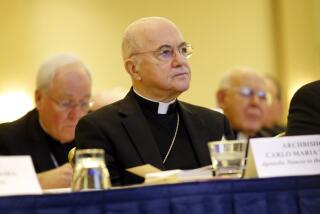Q & A: Israel’s diplomatic row with Turkey
- Share via
Reporting from Jerusalem — Angry over a Turkish TV show that portrayed Israelis as ruthless killers, Israeli Deputy Foreign Minister Danny Ayalon summoned Turkey’s ambassador to his office this month for a dressing-down.
“Pay attention that he is sitting in a lower chair . . . that there is only an Israeli flag on the table and that we are not smiling,” Ayalon told the media, which he had invited to the meeting.
But Ayalon’s attempt at tougher diplomacy backfired, causing outrage in Turkey, which threatened to recall its ambassador unless Israel apologized.
In an interview with the Los Angeles Times, Alon Liel, Israel’s former envoy to Turkey and a Hebrew University lecturer, discussed the state of Israeli diplomacy and relations with Turkey, which have soured in the wake of the offensive in the Gaza Strip a year ago.
Was this diplomatic incident really about the way an ambassador was treated, or was it a symptom of the strained relations between the two countries?
This affair is most definitely part of the ongoing crisis. . . . Israeli outrage at Turkey’s behavior toward it has been building up over the whole year and this cumulative anger was unleashed on [Turkish Ambassador Ahmet Oguz] Celikkol, so the incident is clearly part of the larger crisis.
Why did Israel react the way it did?
This is where Israeli diplomacy comes in. Two weeks ago, Foreign Minister Avigdor Lieberman announced a new Israeli diplomacy: diplomacy of national pride. The days of groveling are over, he said. Already then I began to worry. The incident with Ambassador Celikkol is the first case study of this national pride diplomacy, proving that reinventing diplomacy isn’t possible. Diplomacy is a system of rules; the whole world adheres to these, and breaking them entails a penalty. Shaming an ambassador is the same as shaming the country. We did just this -- and took a beating for it.
Ayalon was forced to apologize. Does this mean tough diplomacy is over?
First of all, this disgraces Israeli diplomacy. Moreover, it was counterproductive in that after Turkey’s recent attacks on Israel, it was Israel that ended up apologizing. This was a colossal mistake on the part of Israeli diplomacy. If the Ministry of Foreign Affairs headed by Lieberman intends to continue case studies of this sort, Israel will take more beatings. There are rules. Israel isn’t so strong that it can beat up on countries in the region. . . . This isn’t to say Israel should have refrained from protest altogether. The situation certainly called for protest. But not in this way.
Why are relations with Turkey important?
Israel cannot afford to sever relations with Turkey in terms of its interests in the region. Turkey is no small or remote country, and cutting ties could deliver a death blow to Israel’s status in the Middle East, already very shaky. We need smart diplomacy and a better grasp of the limits of our power. This was an attempt to show diplomatic muscle and that we have the power to do as we please. . . . But we can’t, and the fact is, Israel backtracked.
Before apologizing, Deputy Foreign Minister Ayalon said in parliament that ultimately, Israel would benefit from this and that relations with Turkey would grow stronger too. Is that possible?
This will stick in Turkish memory for years and have a lasting impact on Israeli diplomacy too. As a former diplomat, I am ashamed; the acting diplomats are too. . . .
It is hard to overlook the fact that Lieberman is controversial. While Prime Minister Benjamin Netanyahu is trying to restart the Israeli-Palestinian peace talks, Lieberman dismisses peace as a possibility for the next decade or two.
Once appointed, he should be judged by his actions. Lieberman had two choices: Take the job seriously and start being Israel’s No. 1 statesman, or go on being the head of his political party from the foreign minister’s seat. He chose the second option. . . .
The heart of Israeli diplomacy is the struggle for legitimization and Israel’s place in the regional and global diplomacy; he says there won’t be peace, anyway, so let’s abandon this altogether. And now he comes with this style, maintaining that all of Israel’s problems are because it doesn’t strike back when it’s attacked. He’s started a boxing match in the international arena; this fight with Turkey was only the first round, and we’re already down.
Does he have a point? Has Israeli diplomacy really been too soft?
Again, the matter of how to react, when and at what volume is a matter of professional judgment. Every country is different, and it requires experience and judgment to know what you can do where. You can’t dictate a standard one-size-fits-all diplomacy. As it turns out, we aren’t the only country in the world with national pride. . . .
The last meeting between President Obama and Netanyahu was interpreted by many in Israel as a diplomatic humiliation.
A power play between politicians is one thing. Diplomatic relations are a different matter. The ambassador is a messenger; he is the person stationed here to solve crises, not around whom crises are to be generated. President Obama is not obliged to follow diplomatic protocol with politicians, but the Foreign Ministry and diplomats certainly are. Such violation of diplomatic protocol by the Foreign Ministry is a game-breaker.
Sobelman is a researcher in The Times’ Jerusalem Bureau.
More to Read
Sign up for Essential California
The most important California stories and recommendations in your inbox every morning.
You may occasionally receive promotional content from the Los Angeles Times.













